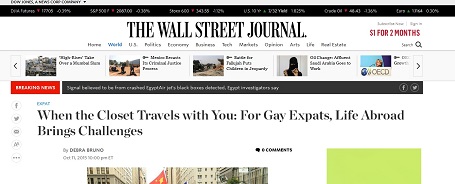When Andrew Caesar moved to South Africa from his home in Australia for a job a few years ago, he thought that as a gay man, he’d be welcomed with open arms.
After all, he was heading to the country of Nelson Mandela and, since 2006, marriage equality for same-sex marriages.
It wasn’t so easy. “There’s still a cultural issue with being gay,” says the 34-year-old who worked for a mining industry company in Johannesburg. While the discrimination was nothing he could prove beyond a doubt, he was certain that he was kept on a short-term contract instead of being hired for a post that was never filled, even though he felt he was more than qualified. He finally tired of the uncertainty and moved back to his home in Brisbane.
The lesson, says Ruth McPhail, associate professor in the business school at Griffith University in Brisbane, Australia, is that LGBT expats need to understand the social climate of a possible posting – even more than the legal climate. “I would have thought that the first thing you do is check the law,” she says. “Apparently not.”
While quite a few countries can be welcoming, LGBT expats have an extra burden of vigilance to pack along with their passports and kitchenware. The findings are the result of years of research and in-depth interviews with 20 LGBT expats and described in a report, co-authored with Kate Hutchings at Griffith University and Yvonne McNulty of the Singapore Institute of Management University. “Lesbian and gay expatriation: opportunities, barriers and challenges for global mobility” was published online in 2014 in the International Journal of Human Resource Management.
For instance, says co-author Ms. McNulty, although India now has laws that make it illegal to discriminate against gays, many gay expats avoid the country. The social norms are far different from the legal system, she explains.












 Printable Version
Printable Version










Reader's Comments
Be the first to leave a comment on this page!
Please log in to use this feature.